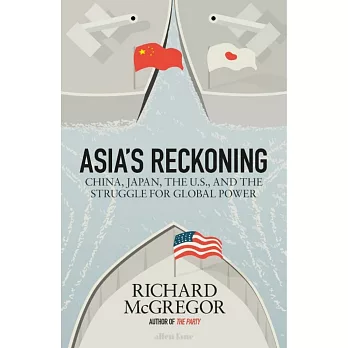美日中的軍事、外交、經濟角力史,並揭露即將浮現的潛在危機
美國、日本、中國,除了位列世界三大經濟體之外,其環太平洋的軍事與外交平衡與否更與台灣有密切的關聯。由資深東亞研究專家,前英國金融時報北京分社社長─馬利德執筆,解析美日中數十年的策略對抗、斜傾與秩序。
半個多世紀以來,美國「成功地維持了太平洋的和平」,協調中日的競爭與緊張局勢(源自過去無盡的戰爭、政治、歷史)。如今,無法預測川普對這些美國老盟友的衝動,再加上積累的各種不定因素,兩相結合將威脅到這些區域,正加速戰後秩序的解體。如果說美國協助奠定了戰後現代亞洲的基礎、現今全球經濟主力,本書則揭露這結構如何崩解。
馬利德(Richard McGregor)將龐雜的歷史事件撰寫成一個龐大的故事,藉由訪問美國和亞洲各個檔案館,以及三個國家的許多主要參與者,將外交板塊移動與國內政治趨勢、人物行為相結合。不只講述一則驚心動魄的美國故事,也是亞洲大國崛起的寫真。中國和日本越來越多被建立起來的對抗衝突,已非鄰國之間簡單的混亂。此區域的一舉一動都影響著各大陸的製造業中心、貿易路線和政治抉擇,政治和經濟的海嘯一觸即發。
Asia's Reckoning前半段起始於二戰後的中國政治,審視70、80、90年代美國周旋於中日兩國的遊說與佈局,後半段則聚焦二十世紀中國已攀升至現今地位後的情勢變化。馬利德透過立體的人物塑造與清楚的外交戰爭始末,不只提供研究東亞軍事、政治、經貿史讀者可供借鑑的資料,也是所有關心世界局勢的讀者都該閱讀的精彩之作。
作者馬利德(Richard McGregor)曾任職威爾遜國際學者中心季辛吉美中政策研究機構,英國《金融時報》副主編與北京分社社長。1990年開始在亞洲從事新聞報導,著有《中國共產黨不可說的祕密》、Japan Swings: Politics, Culture and Sex in the New Japan。(文/博客來編譯)
「將美國白宮“理想主義與傲慢的結合”精闢地評述解析,馬利德詳細生動地描繪了美國的亞洲外交手段。」—《出版者周刊》
“Often critical of Washington’s ‘combination of idealism and arrogance,’ McGregor offers detailed, vivid descriptions of America’s Asian diplomacy.” —Publishers Weekly
A history of the combative military, diplomatic, and economic relations among China, Japan, and the United States since the 1970s—and the potential crisis that awaits them
Richard McGregor’s Asia’s Reckoning is a compelling account of the widening geopolitical cracks in a region that has flourished under an American security umbrella for more than half a century. The toxic rivalry between China and Japan, two Asian giants consumed with endless history wars and ruled by entrenched political dynasties, is threatening to upend the peace underwritten by Pax Americana since World War II. Combined with Donald Trump’s disdain for America’s old alliances and China's own regional ambitions, east Asia is entering a new era of instability and conflict. If the United States laid the postwar foundations for modern Asia, now the anchor of the global economy, Asia’s Reckoning reveals how that structure is falling apart.
With unrivaled access to archives in the United States and Asia, as well as to many of the major players in all three countries, Richard McGregor has written a tale that blends the tectonic shifts in diplomacy with bitter domestic politics and the personalities driving them. It is a story not only of an overstretched America, but also of the rise and fall and rise of the great powers of Asia. The about-turn of Japan—from a colossus seemingly poised for world domination to a nation in inexorable decline in the space of two decades—has few parallels in modern history, as does the rapid rise of China—a country whose military is now larger than those of Japan, South Korea, Taiwan and southeast Asia's combined.
The confrontational course on which China and Japan are set is no simple spat between neighbors: the United States would be involved on the side of Japan in any military conflict between the two countries. The fallout would be an economic tsunami, affecting manufacturing centers, trade routes, and political capitals on every continent. Richard McGregor’s book takes us behind the headlines of his years reporting as the Financial Times’s Beijing and Washington bureau chief to show how American power will stand or fall on its ability to hold its ground in Asia.



 天天爆殺
天天爆殺  今日66折
今日66折 














































![The Fifth Annual Report of the Incorporated Church Society of the Diocese of Huron [microform]: for the Year Ending May 15th, 1863](http://im2.book.com.tw/image/getImage?i=https://www.books.com.tw/img/F01/842/96/F018429619.jpg&v=618142b5k&w=210&h=210)




![The History Of Ireland, From The Earliest Authentic Accounts [an Abridgment Of Leland’s History Of Ireland] By The Editors Of The Modern Universal His](http://im1.book.com.tw/image/getImage?i=https://www.books.com.tw/img/F01/a26/13/F01a261302.jpg&v=64e36cdck&w=210&h=210)










![Nintendo Switch 2 Edition遊戲軟體《寶可夢傳說 Z─A》中文版[台灣公司貨]](http://im2.book.com.tw/image/getImage?i=https://www.books.com.tw/img/N00/181/27/N001812799.jpg&v=6878b34fk&w=210&h=210)


![Nintendo Switch遊戲軟體《寶可夢傳說 Z─A》中文版[台灣公司貨]](http://im1.book.com.tw/image/getImage?i=https://www.books.com.tw/img/N00/181/02/N001810258.jpg&v=6878b401k&w=210&h=210)






![[星巴克]斑紋貓尾巴便利單杯提袋](http://im2.book.com.tw/image/getImage?i=https://www.books.com.tw/img/N00/182/37/N001823767.jpg&v=683d8ad1k&w=210&h=210)

![[星巴克]藍貓咪尾巴便利單杯提袋](http://im1.book.com.tw/image/getImage?i=https://www.books.com.tw/img/N00/181/46/N001814668.jpg&v=6810cda4k&w=210&h=210)


![[星巴克]星巴克木蓋折疊收納箱](http://im2.book.com.tw/image/getImage?i=https://www.books.com.tw/img/N00/182/37/N001823769.jpg&v=683d8b86k&w=210&h=210)

![[星巴克]STANLEY真空濾壓壺 白色](http://im2.book.com.tw/image/getImage?i=https://www.books.com.tw/img/N00/149/39/N001493915.jpg&v=6350f13ck&w=210&h=210)










![Nintendo Switch 2主機包含《瑪利歐賽車世界》盒裝版 [台灣公司貨]](http://im2.book.com.tw/image/getImage?i=https://www.books.com.tw/img/N00/181/26/N001812641.jpg&v=67fdd295k&w=210&h=210)





























![Champagne [boxed Book & Map Set]: The Essential Guide to the Wines, Producers, and Terroirs of the Iconic Region](http://im1.book.com.tw/image/getImage?i=https://www.books.com.tw/img/F01/401/17/F014011772.jpg&v=5dc3804ek&w=110&h=110)






 博客來
博客來 博客來
博客來 博客來
博客來 博客來
博客來 博客來
博客來